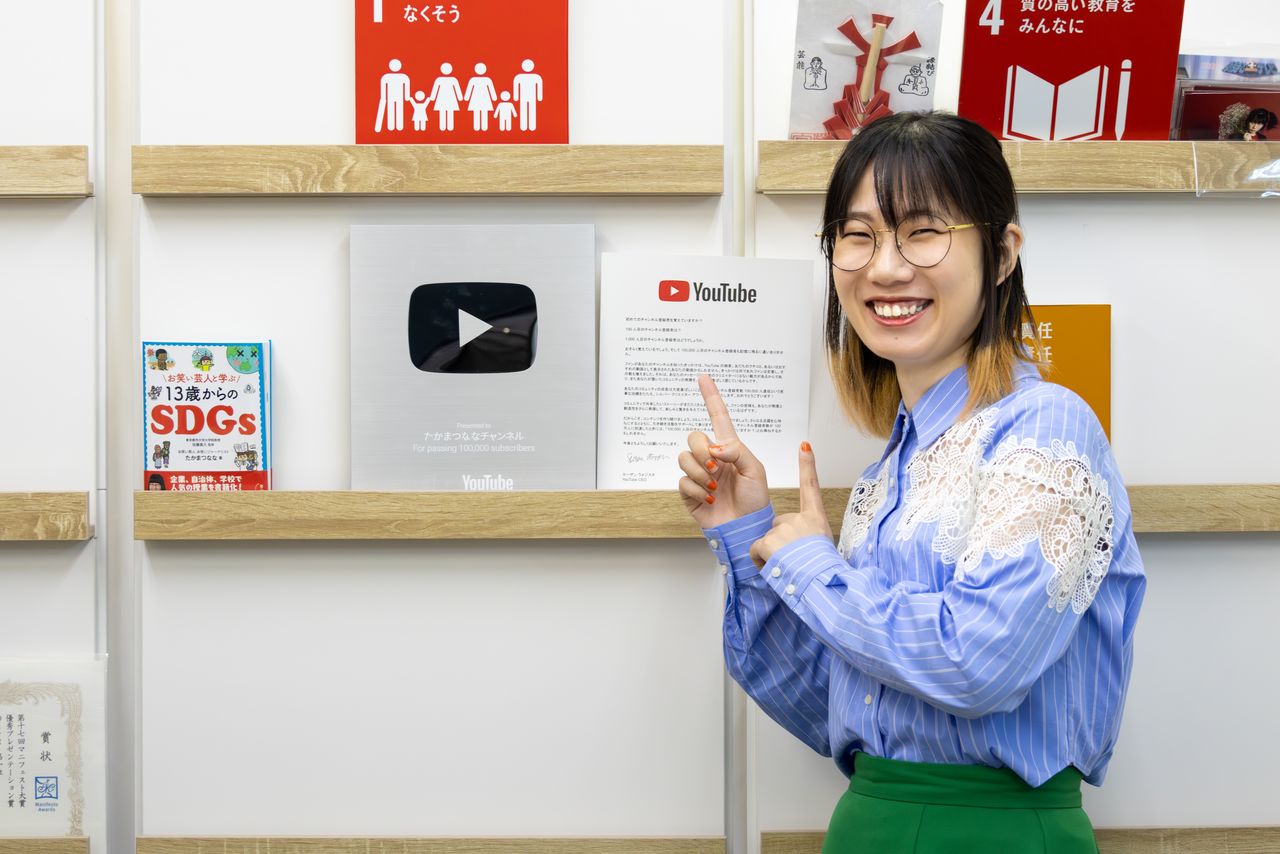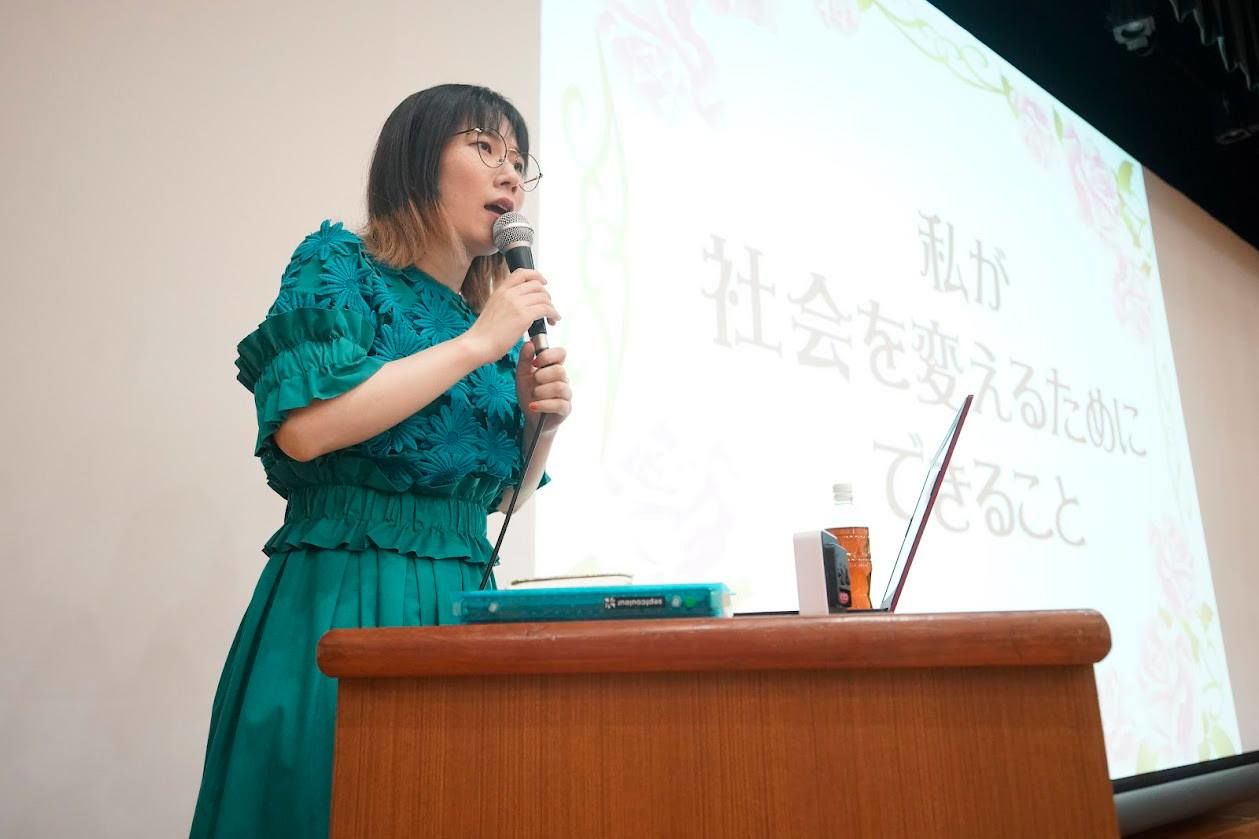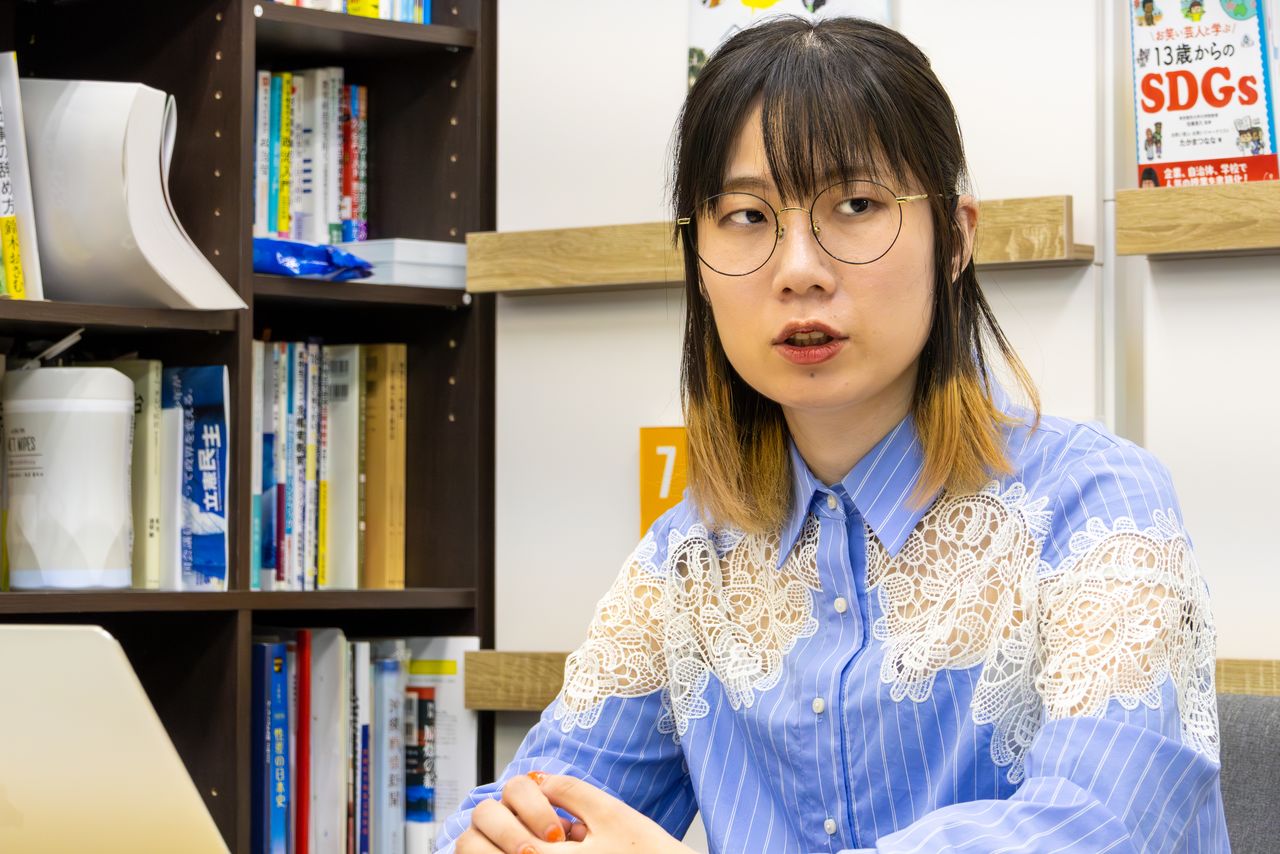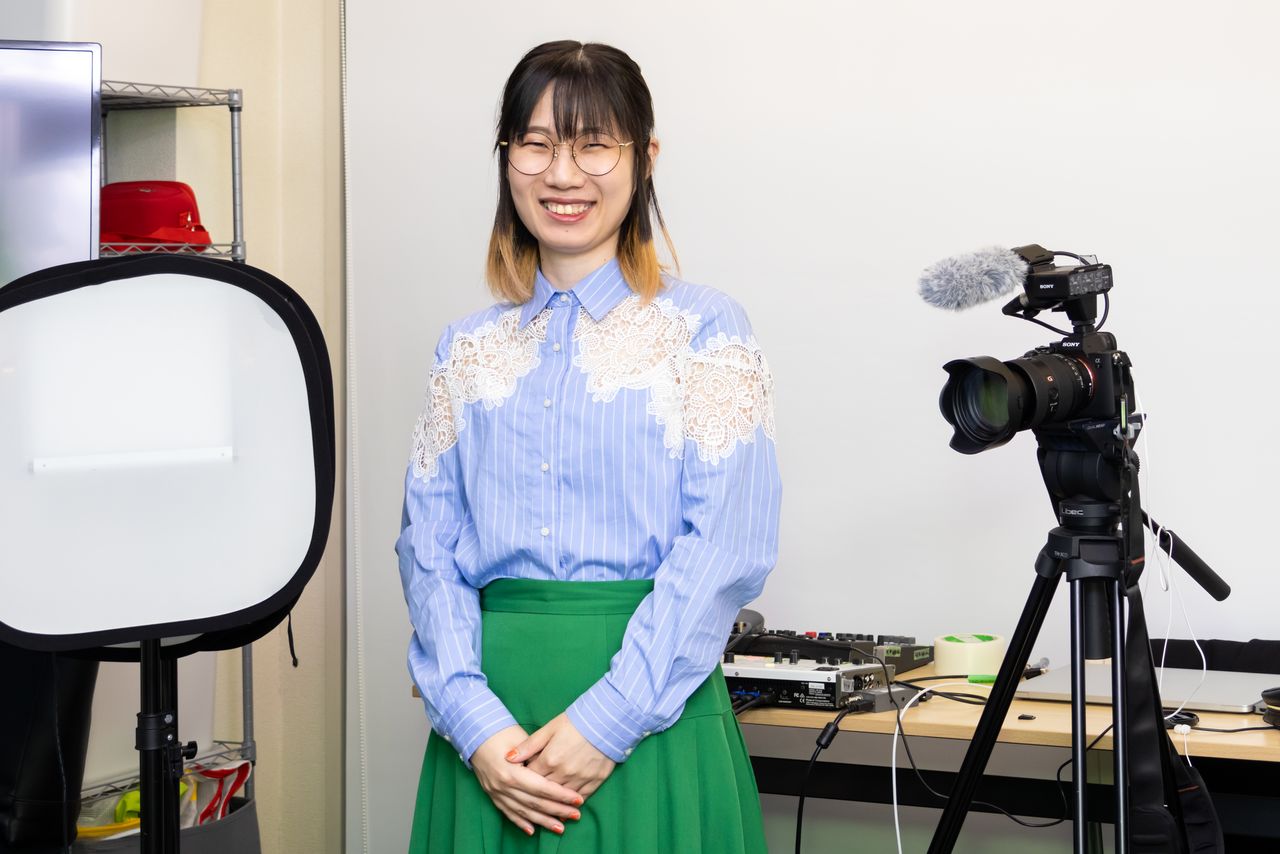Takamatsu Nana is president of a company that works to provide fun-filled citizenship lessons at schools around Japan hoping to inspire young people to become more engaged with politics and realize their ability to change society for the better. Her efforts have already achieved some impressive results.
Low Turnout and the Impact of Social Media
In the October 2024 election for the House of Representatives, an ongoing scandal over financial kickbacks and other improprieties saw the Liberal Democratic Party and its coalition partner reduced to a majority of seats in the Diet, although they just about managed to hold onto power. At 53.85 percent, voter turnout was the third lowest for any election in Japan’s postwar democratic history.
“I think the money and politics scandal was the last straw for many people, shattering whatever trust they might have had in politics. I must admit, I was shocked by how low the turnout was,” says 31-year-old Takamatsu Nana, president of Shōka Sonjuku (literally the Laughter Village Academy). “People are losing their faith in politics and democracy and I think that’s something we should be extremely worried about.”
Engagement among young voters has also remained stubbornly low. This was the sixth national election since the voting age was lowered to 18, but less than half of eligible 18 and 19-year-olds bothered to vote. Turnout among this cohort was just 43.06%: more than 10 points lower than the national average across all age groups. In this context, one interesting aspect of the election was the rise of the Democratic Party for the People, which took 28 seats, or four times the number it held before the election, thanks in large part to support from young people. Most commentators agreed that the party’s skillful use of social media helped it to appeal to the under-forties.
“Whether a candidate is able to campaign effectively online as well as via more traditional media now has a major impact on election results,” says Takamatsu. “Candidates don’t have sufficient time to engage in proper discussions on policy face-to-face, and this leads to a tendency for debates to remain shallow and underdeveloped.”
Ideally, young people would not be mere passive consumers of information beamed at them by candidates and parties over the internet, but would understand the relevance of social issues to their own lives. They would then consider the issues subjectively and independently and exercise their right to vote. For the past eight years, Takamatsu has been trying to engage young people with politics by visiting schools and offering humorous, comedy-driven classes on important social and political issues and how they relate to students’ lives. She has already reached more than 70,000 schoolchildren through these classes.
A class at Bunka Gakuen University Suginami High School on October 2, 2024. (© Shōka Sonjuku)
Using Laughter to Drive Social Change
What moved Takamatsu to harness the power of laughter for citizenship education?
Takamatsu first became interested in social issues in fourth grade, when she took part as a volunteer helping to clear litter on Mount Fuji. She says this eye-opening exposure to the ugly reality of illegal dumping horrified her. In junior high, she became a journalist on a children’s newspaper, and wrote articles about the environment and other issues, but was disappointed when the things she wrote had only limited impact.
While she was searching for more effective ways to share her concerns, she came across a book of conversations between the popular comedian Ōta Hikari and a cultural anthropologist on the subject of the Japanese Constitution’s Article 9, which renounces war. The book inspired her to think that she could use laughter to raise awareness of social issues, and she resolved to work on polishing her talent as a comedian as she pursued her studies.
She also started entering various essay competitions and speech contests, and during her third year in high school won a prestigious prize from the United Nations Information Center in Tokyo. She was sent as a student peace ambassador to an arms reduction conference in Geneva, where she gave a speech calling for the abolition of nuclear weapons.
She made her debut as a comedian as a student at Keiō University, and started to appear on television and stage. Her ability to hire well-known entertainers and send them into schools as guest lecturers for her classes today is testimony to the strong network she built up in those early years.
In 2016, when she was in her first year at graduate school (also at Keiō), the voting age was lowered to 18. Inspired by the change, she decided to start Shōka Sonjuku with the aim of reversing the tendency for young people to drift away from politics. The name of the company was a punning reference to Yoshida Shōin ’s famous Shōka Sonjuku school, which despite its small size played a key role in the mid-nineteenth century by educating several of the reformists who went on to bring about the Meiji Restoration.
After completing her graduate studies, she joined NHK as a director. Her dream was to use her position to make programs that would communicate political and social issues to the young generation, but she soon came up against the limits of what could realistically be achieved at such a media behemoth and left after a few years. She renewed her dedication to voter citizen education and launched her own YouTube channel.

Takamatsu Nana works hard on creating content for her YouTube channels. (© Nippon.com)
Opportunity Knocks
But it was not all plain sailing. The company sometimes gave its classes free of charge, often at schools far from the big cities, and costs soon mounted up once transport, honorariums for the entertainers who helped as lecturers, and other materials were factored in. It was more than Takamatsu could cover out of her own income from performances and lectures, and she took to raising extra funding from donations and crowdfunding.
A golden opportunity came when she formed a collaboration with Yamamoto Ichita, governor of Gunma Prefecture. In the run-up to the upper house election in July 2022, the governor and his team decided to sponsor a series of Takamatsu’s “laugh-out-loud political education” classes at all 79 high schools in the prefecture. The prefecture also came up with the necessary budget. The program started three months before the election. When the results came in, it was found that voter turnout for 18-year-old voters in the prefecture was up by 8.34 points from the previous upper house election in 2019. Even Governor Yamamoto was apparently surprised by how effective the classes had been.
Last year, I accompanied Takamatsu to her classes and had an opportunity to talk to some of the students. The comedians she had hired to give the lessons skillfully wove anecdotes and jokes into their lessons, as they explained the workings of democracy and elections in a way that was accessible and relevant for young people. If young people do not vote, they pointed out, politicians will have no incentive to prioritize policies that benefit young people. The lessons creatively used quizzes and games to show how young people stood to lose out as a result.
At first, the students listened without much apparent interest to what Takamatsu and her collaborators were saying, but their engagement soon picked up. By the time the 90-minute sessions ended, they were leaning forward in rapt attention.
The enthusiasm of the students for this refreshing new style of teaching was palpable, winning such comments as, “Until now my friends and I never talked about politics, but the game-like approach of this lesson made the topic fun and showed me that politics is something that affects me personally,” “The class made me feel hopeful that maybe I can help to change society too,” and “After the class, I made up my mind to vote in the election.” Clearly the classes were having an impact.
In 2022, Takamatsu traveled to Europe to learn more about young people’s involvement in politics in several countries there. The differences with Japan astonished her, and she felt much more engagement was encouraged.
“Generally, in Japanese schools, students are looked on as something to be controlled and managed. We need a rethink. We need to ask ourselves whether our system is really treating children as individuals with rights. Does it respect their freedoms and reflect their opinions? And if not, why not?”
Think for Yourself
In April 2024, the Nippon Foundation carried out a survey of students aged 17 to 19 in six countries (Japan, the United States, Britain, China, South Korea, and India). Japan came bottom in students’ responses to two prompts: “I believe my own actions can change my country and society” (45.8%) and “I believe that my own country’s future will get better” (15%). The survey also underlined remarkably low levels of positivity and optimism among Japanese respondents about their own ability to shape society and make their views heard.
In her classes, Takamatsu introduces students to cases in which young people have helped to solve social issues while still in their teens, and encourages them to think about what aspects of society they would like to change and how they might achieve that change, and then has them present their ideas.

Takamatsu talking to students at Bunka Gakuen University Suginami High School on October 2, 2024. (© Shōka Sonjuku)
Once prompted, students are full of ideas for changes they would like to see: from school rules and uniforms to wider cycling lanes on the way to school and more trains during school commuting hours. They are also not short of suggestions for ways of achieving these goals, from petitions and social media campaigns to approaching mainstream media, petitioning local authorities and companies, and even ultimately “becoming a politician.”
“Increasing voter participation among young people is important, but I wouldn’t want that to be the only metric by which these classes are measured. The real purpose, as far as I’m concerned, is to encourage young people to think for themselves, and to learn to play an active role in society. I want them to develop the confidence to change society through their actions.”
Advising the Governor
In 2023, Gunma Prefecture introduced a system of “reverse mentors” to build on the success of Takamatsu’s lessons. The term is originally a corporate practice, in which junior employees give advice to their superiors in the company. In Shōka Sonjuku’s version of the system, 10 high school students are selected as mentors to advise the prefectural governor, and are free to come up with their own ideas and policy proposals. The prefectural government has implemented a wide range of policies based on recommendations from the “mentors,” including an e-sports competition to bring together people from different age groups, a video promoting the HPV vaccine, and making vaccinations available in shopping malls.
Inspired by Gunma’s example, Koga, Fukuoka, has also collaborated with Shōka Sonjuku to introduce a similar system of using high school students as “reverse mentors.” Takamatsu hopes the idea will spread around the country but admits that local authorities vary considerably in their level of interest in citizenship education and allowing children to express their opinions. All she can do, she says, is work to achieve results one step at a time.
“Things are gradually changing. We’ve already had children who were inspired by our lessons speak up and try to change school rules. For high school students, I think the most important thing is for them to see for themselves how their opinions can connect with wider society and make a difference. My hope is that this awareness of how issues can affect them personally will move them to take action. Small experiences of success build confidence, and that confidence will build into a force that can drive change in wider society.”
Ultimately, Takamatsu says she wants to make the case for democracy within the schools themselves.
“For that to be possible, first the teachers need to trust the children. And the children need to trust their chosen representative. Democracy is built on trust. In France, for example, the law requires frameworks to be in place that allow student representatives to take part in the running of the school.
“Someone told me it took 30 years for this idea to take root and spread. In Japan, it might take 50. But however long it takes, we definitely need a system that will allow children to make their voices heard.”
(Originally published in Japanese on November 29, 2024. Banner photo: Takamatsu Nana talks to students as part of her educational show about politics at Bunka Gakuen University Suginami High School on October 2, 2024. © Shōka Sonjuku.)
This post was originally published on here









